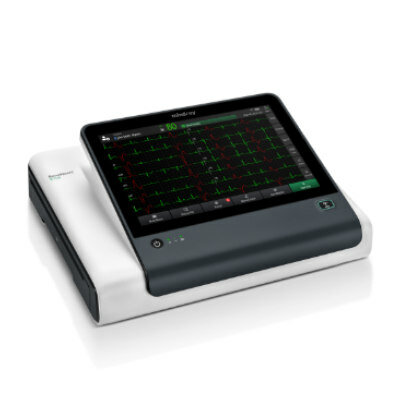Frailty Screening Before Surgery Reduces Risk of Death
|
By Daniel Beris Posted on 13 Dec 2016 |
Widespread screening of patients preoperatively to identify frailty and take appropriate measures can improve surgical outcomes, according to a new study.
Researchers at the University of Pittsburgh (PITT; PA, USA) and the Veterans Affairs (VA) Pittsburgh Healthcare System (PA, USA) conducted a study in 9,153 surgical patients (average age 60 years) to examine the impact of a frailty screening initiative (FSI) on death and complication rates. The researchers compared surgical outcomes of major, elective, noncardiac surgery patients treated both before and after implementation of the FSI, with preoperative frailty assessed using a 14-item risk analysis index (RAI) questionnaire.
The medical records of all frail patients were flagged for administrative review before the scheduled operation. On the basis of the review, clinicians from surgery, anesthesia, critical care, and palliative care were notified of the patient's frailty and associated surgical risks; if indicated, perioperative plans were modified based on team input. The results showed that overall 30-day mortality decreased from 1.6% to 0.7% after FSI implementation, with improvement greatest among frail patients (12.2% to 3.8%), although mortality rates also decreased among robust patients (1.2% to 0.3%). The study was published on November 30, 2016, in JAMA Surgery.
“The ultimate cause of the survival benefit is likely multifactorial, including changes in preoperative decision-making, intraoperative management, and postoperative rescue,” concluded lead author Daniel Hall, MD, MDiv, MHSc, and colleagues. “This study reveals the feasibility of facility-wide frailty screening in elective surgical populations; it also suggests the potential to improve postoperative survival among the frail through systematic administrative screening, review, and optimization of perioperative plans.”
Frailty is theoretically defined as a clinically recognizable state of increased vulnerability, resulting from aging-associated decline in reserve and function across multiple physiologic systems, so that the ability to cope with everyday or acute stressors is compromised. In the absence of a gold standard, frailty has been operationally defined as meeting three out of five phenotypic criteria: low grip strength, low energy, slowed waking speed, low physical activity, and/or unintentional weight loss.
Related Links:
University of Pittsburgh
Veterans Affairs Pittsburgh Healthcare System
Researchers at the University of Pittsburgh (PITT; PA, USA) and the Veterans Affairs (VA) Pittsburgh Healthcare System (PA, USA) conducted a study in 9,153 surgical patients (average age 60 years) to examine the impact of a frailty screening initiative (FSI) on death and complication rates. The researchers compared surgical outcomes of major, elective, noncardiac surgery patients treated both before and after implementation of the FSI, with preoperative frailty assessed using a 14-item risk analysis index (RAI) questionnaire.
The medical records of all frail patients were flagged for administrative review before the scheduled operation. On the basis of the review, clinicians from surgery, anesthesia, critical care, and palliative care were notified of the patient's frailty and associated surgical risks; if indicated, perioperative plans were modified based on team input. The results showed that overall 30-day mortality decreased from 1.6% to 0.7% after FSI implementation, with improvement greatest among frail patients (12.2% to 3.8%), although mortality rates also decreased among robust patients (1.2% to 0.3%). The study was published on November 30, 2016, in JAMA Surgery.
“The ultimate cause of the survival benefit is likely multifactorial, including changes in preoperative decision-making, intraoperative management, and postoperative rescue,” concluded lead author Daniel Hall, MD, MDiv, MHSc, and colleagues. “This study reveals the feasibility of facility-wide frailty screening in elective surgical populations; it also suggests the potential to improve postoperative survival among the frail through systematic administrative screening, review, and optimization of perioperative plans.”
Frailty is theoretically defined as a clinically recognizable state of increased vulnerability, resulting from aging-associated decline in reserve and function across multiple physiologic systems, so that the ability to cope with everyday or acute stressors is compromised. In the absence of a gold standard, frailty has been operationally defined as meeting three out of five phenotypic criteria: low grip strength, low energy, slowed waking speed, low physical activity, and/or unintentional weight loss.
Related Links:
University of Pittsburgh
Veterans Affairs Pittsburgh Healthcare System
Latest Surgical Techniques News
- Pioneering Sutureless Coronary Bypass Technology to Eliminate Open-Chest Procedures
- Intravascular Imaging for Guiding Stent Implantation Ensures Safer Stenting Procedures
- World's First AI Surgical Guidance Platform Allows Surgeons to Measure Success in Real-Time
- AI-Generated Synthetic Scarred Hearts Aid Atrial Fibrillation Treatment
- New Class of Bioadhesives to Connect Human Tissues to Long-Term Medical Implants
- New Transcatheter Valve Found Safe and Effective for Treating Aortic Regurgitation
- Minimally Invasive Valve Repair Reduces Hospitalizations in Severe Tricuspid Regurgitation Patients
- Tiny Robotic Tools Powered by Magnetic Fields to Enable Minimally Invasive Brain Surgery
- Magnetic Tweezers Make Robotic Surgery Safer and More Precise
- AI-Powered Surgical Planning Tool Improves Pre-Op Planning
- Novel Sensing System Restores Missing Sense of Touch in Minimally Invasive Surgery
- Headset-Based AR Navigation System Improves EVD Placement
- Higher Electrode Density Improves Epilepsy Surgery by Pinpointing Where Seizures Begin
- Open-Source Tool Optimizes Placement of Visual Brain Implants
- Easy-To-Apply Gel Could Prevent Formation of Post-Surgical Abdominal Adhesions
- Groundbreaking Leadless Pacemaker to Prevent Invasive Surgeries for Children
Channels
Critical Care
view channel
Ingestible Smart Capsule for Chemical Sensing in the Gut Moves Closer to Market
Intestinal gases are associated with several health conditions, including colon cancer, irritable bowel syndrome, and inflammatory bowel disease, and they have the potential to serve as crucial biomarkers... Read moreNovel Cannula Delivery System Enables Targeted Delivery of Imaging Agents and Drugs
Multiphoton microscopy has become an invaluable tool in neuroscience, allowing researchers to observe brain activity in real time with high-resolution imaging. A crucial aspect of many multiphoton microscopy... Read more
Novel Intrabronchial Method Delivers Cell Therapies in Critically Ill Patients on External Lung Support
Until now, administering cell therapies to patients on extracorporeal membrane oxygenation (ECMO)—a life-support system typically used for severe lung failure—has been nearly impossible.... Read morePatient Care
view channel
Portable Biosensor Platform to Reduce Hospital-Acquired Infections
Approximately 4 million patients in the European Union acquire healthcare-associated infections (HAIs) or nosocomial infections each year, with around 37,000 deaths directly resulting from these infections,... Read moreFirst-Of-Its-Kind Portable Germicidal Light Technology Disinfects High-Touch Clinical Surfaces in Seconds
Reducing healthcare-acquired infections (HAIs) remains a pressing issue within global healthcare systems. In the United States alone, 1.7 million patients contract HAIs annually, leading to approximately... Read more
Surgical Capacity Optimization Solution Helps Hospitals Boost OR Utilization
An innovative solution has the capability to transform surgical capacity utilization by targeting the root cause of surgical block time inefficiencies. Fujitsu Limited’s (Tokyo, Japan) Surgical Capacity... Read more
Game-Changing Innovation in Surgical Instrument Sterilization Significantly Improves OR Throughput
A groundbreaking innovation enables hospitals to significantly improve instrument processing time and throughput in operating rooms (ORs) and sterile processing departments. Turbett Surgical, Inc.... Read moreHealth IT
view channel
Printable Molecule-Selective Nanoparticles Enable Mass Production of Wearable Biosensors
The future of medicine is likely to focus on the personalization of healthcare—understanding exactly what an individual requires and delivering the appropriate combination of nutrients, metabolites, and... Read more
Smartwatches Could Detect Congestive Heart Failure
Diagnosing congestive heart failure (CHF) typically requires expensive and time-consuming imaging techniques like echocardiography, also known as cardiac ultrasound. Previously, detecting CHF by analyzing... Read moreBusiness
view channel
Expanded Collaboration to Transform OR Technology Through AI and Automation
The expansion of an existing collaboration between three leading companies aims to develop artificial intelligence (AI)-driven solutions for smart operating rooms with sophisticated monitoring and automation.... Read more
















